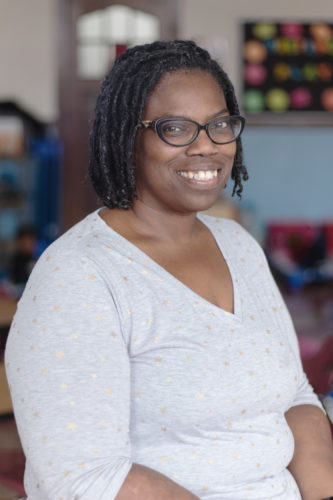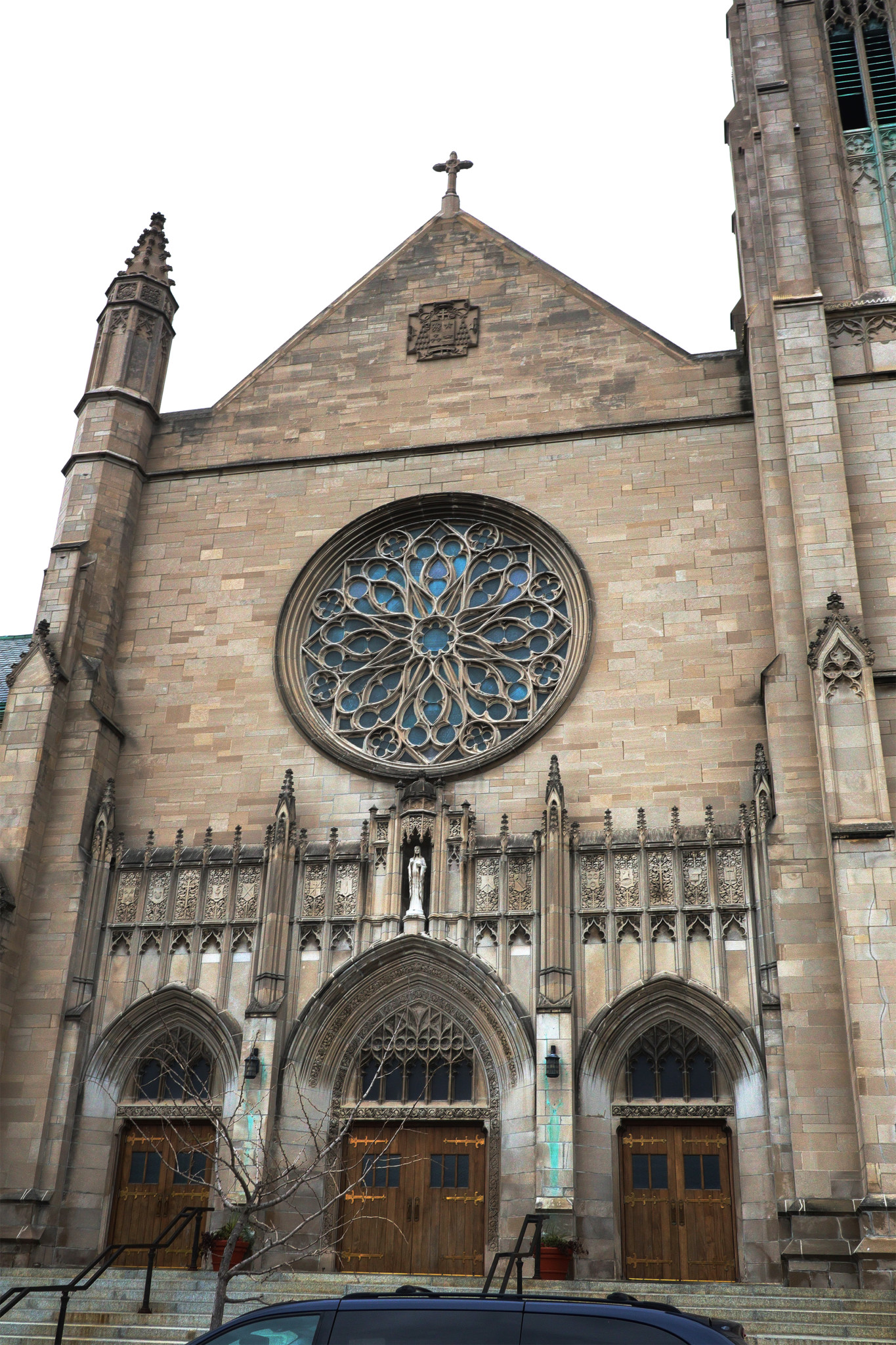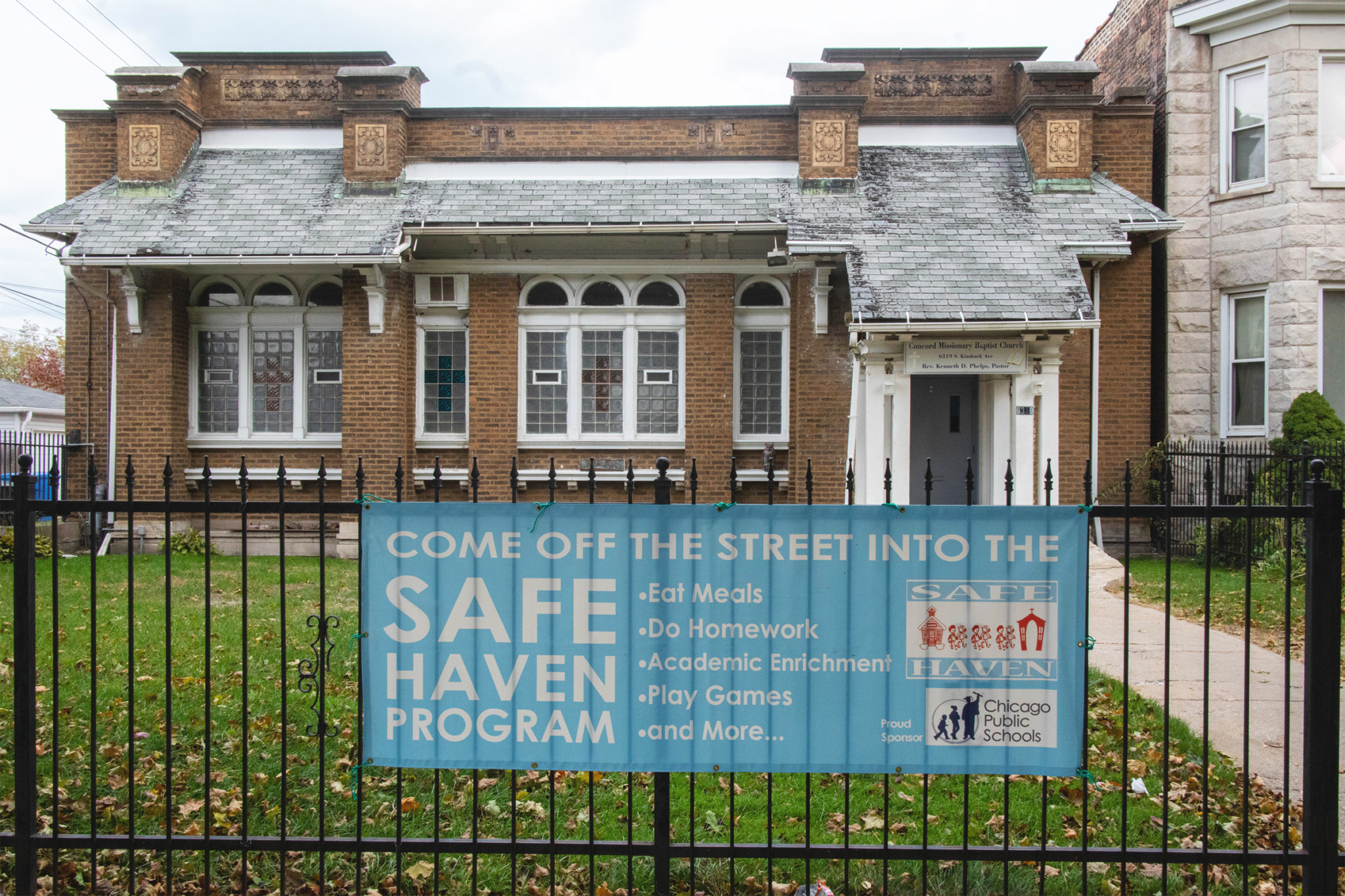It’s the end of summer camp, and kids are sitting at tables in the basement of Woodlawn Baptist Church. Everyone is going around and giving compliments to each other—kids compliment their fellow campers and recount funny or memorable events that happened over the summer. Ms. Kayla Bell, known at camp as Miss Kayla, gets up and compliments the children on how much they’ve matured over the summer. “All of you have taught me a lot. I’m really going to miss you,” she said.
This summer camp is not run by a private company or a nonprofit, but instead by a partnership between the Chicago Public Schools and faith communities across the city. The program is called “Safe Haven,” and while it serves children all over the city, most of its partners are on the South and West Sides.
Safe Haven is managed by CPS’s Office of Faith Based Initiatives. In addition to Safe Haven, the office runs programs such as Children First Fund, which provides families with funds for funeral services should the death of a student occur, and Adopt-A-School, which connects schools to faith communities that support the school through volunteers and donations.
Safe Haven was started under then Mayor Richard M. Daley’s administration and contains three programs: after-school programs, extended programs during spring break, and summer camp. It serves 12,000 children annually, including over 1,000 this past summer, according to Alan Conley, the current director of the Office of Faith Based Initiatives. “One of the strongest initiatives that we had was the Safe Haven program,” said Conley.
For the parents of the children that attend the Safe Haven program, it isn’t just another city program—it’s a lifeline. The program often fills a need for working parents seeking a place for their kids to stay engaged and safe while school is out during the summer months. Jennifer Moore, who has a daughter in the program, said “Hopefully they’ll have it [Safe Haven] here every year, because I drop her off and, you know, one hundred percent of the time, you’re worried: if you’re working, who’s going to take care of the little one? When I’m at work, I have no worries at all. So I would use them and suggest them to anyone who is looking for childcare.”
Nicole Bell, the program director for Safe Haven at Woodlawn Baptist Church, noted the program is often the only choice for many parents who do not have access to other resources during the summer break.

“It gives more people in the community an opportunity to have their children be able to do something over the summer that they might not—as a matter of fact, a father just came in today and was like, ‘I’m so grateful that you guys are here, I don’t know what I would have done with my son this summer, ‘cause I can’t afford the summer camps that charge $200 a week or $1000 for the summer,’” said Bell.
Each church is able to offer its own unique spin on the program. Concord Missionary Baptist Church in Woodlawn has a longtime connection with Aaron Franklin, co-founder of MuzicNet School of Music in Chatham. As a result, the church was able to create a Safe Haven program that emphasizes music more than most.
In an interview, Franklin spoke about the positive impact of music on children’s lives. “The importance of music in children’s education—it helps them in their math skills, their reading skills, their spatio-temporal skills, so many benefits, even their social skills. It gives them more confidence, which allows them to interact with other students on a more advanced basis,” said Franklin. “Every Safe Haven program should have a music component, again, there are so many benefits. When you accomplish something like music or sports or whatever, it seems to occupy their attention, which will then take away attention from the negatives.”
At Woodlawn Baptist Church, Nicole and Kayla Bell helped expand the current anti-bullying curriculum to address anti-LGBTQ discrimination and ableism. “One time we were walking down to the park and they came across a woman who was disabled, so then we were able to pose a conversation about that because of some of the reactions that we got. We just talked about how everyone’s different and some people are unique and there’s just different things about everyone, and how we should embrace those differences rather than just note that they are different,” said Kayla Bell. “You would be amazed at six- and seven-year-old’s idea of sexuality and how it relates to them. We’ve had quite a few conversations as far as relationships in terms of boys and girls and being nice to people who might identify themselves differently than us,” said Nicole Bell.
Parents and volunteers have noted that the program allows children to access and discuss their emotions in a way that does not happen in the classroom setting. Nicole Bell explained, “[Safe Haven] gives adults and children an opportunity to talk about things that you don’t really talk about in everyday life. In a school setting, you teach children about rules and things like that, but you don’t get a chance to engage their thoughts about rules, or how they’re feeling about having conflict with their classmates.” Parent Laticia Taiwo said, “I like the program because they have mentors. They have young adults that are working with the kids and they encourage [the kids] a lot. They talk to them about the problems or spats that they might have with other students.”
Volunteers also noticed positive growth in the behavior of the children between the beginning and end of the summer. “When they got here they weren’t very disciplined, but they were whatever their parents wanted them to be, but now they’re well-versed to go anywhere” said Artist Mitchell. Mother and volunteer Natasha Martin saw this with her own kids, saying “My children, they’re twins, so they stay together a lot. But with this program I see them venturing out and separating from each other and being with the other children.”

While the program currently serves thirty-seven churches, there is a desire for increased funding. “Certainly we need more funding. Right now CPS, we put up $900,000, we get $1 million from the city, so it’s a $1.9 million budget. Right now we have thirty-seven churches across the city. That’s not a lot of money, but we want to make sure that we’re able to continue offering the program at no cost to our parents,” said Conley. For the fiscal year ending in 2019, the Chicago Public Schools system had an operating budget of about $5.98 billion.
The lack of funding limits available activities, and requires volunteers to teach classes. “It would be nice if we could get an official dance instructor that could teach them technical terms and positioning and how exercise helps them stay nimble,” said Nicole Bell.
Clifton Davis, who runs the Safe Haven program at Saint Sabina Church in Auburn Gresham, expressed his desire for more broad and diverse activities for children who participate in Safe Haven. “I wish it was more of a variety of classes for them to do instead of just working with that curriculum, which is why we try to institute different things like our arts and crafts,” said Davis.
Moore has been thankful for Safe Haven this past summer. Between her work at Lurie Children’s Hospital and running her own jewelry business, she was glad to have a space where her daughter can have fun. “The name says it all, I was looking around for a program after school let out, and I actually know the Bells, and I wouldn’t take her anyplace else.”
Siri Chilukuri is a journalist and science student at The New School in New York. She last wrote for the Weekly about Josh Levin’s The Queen.

